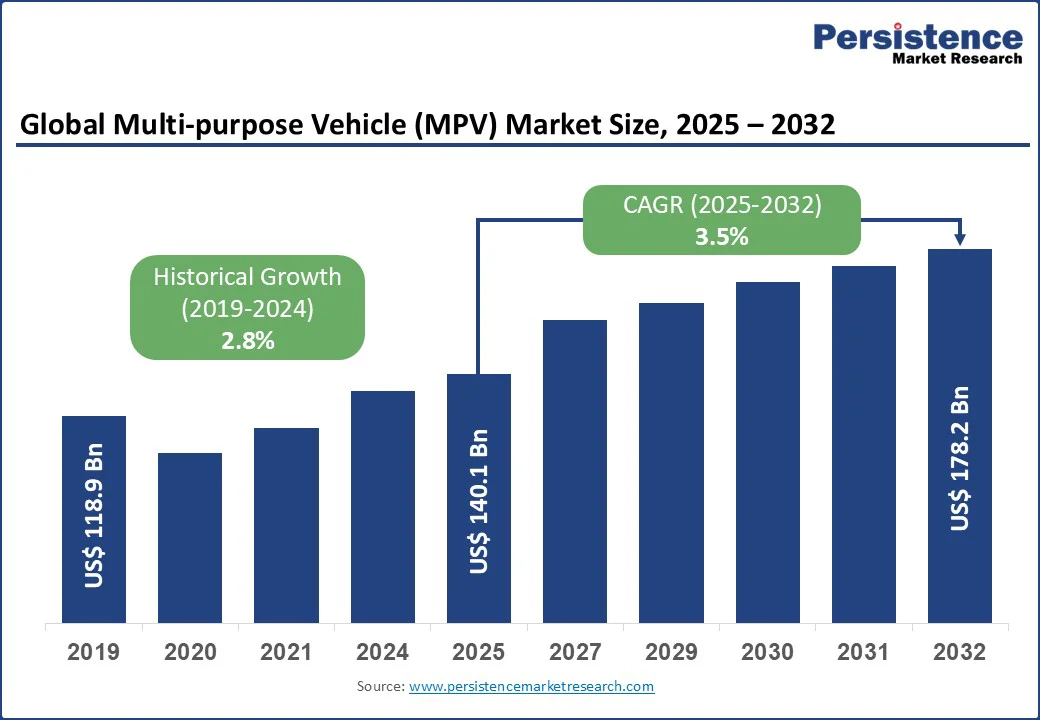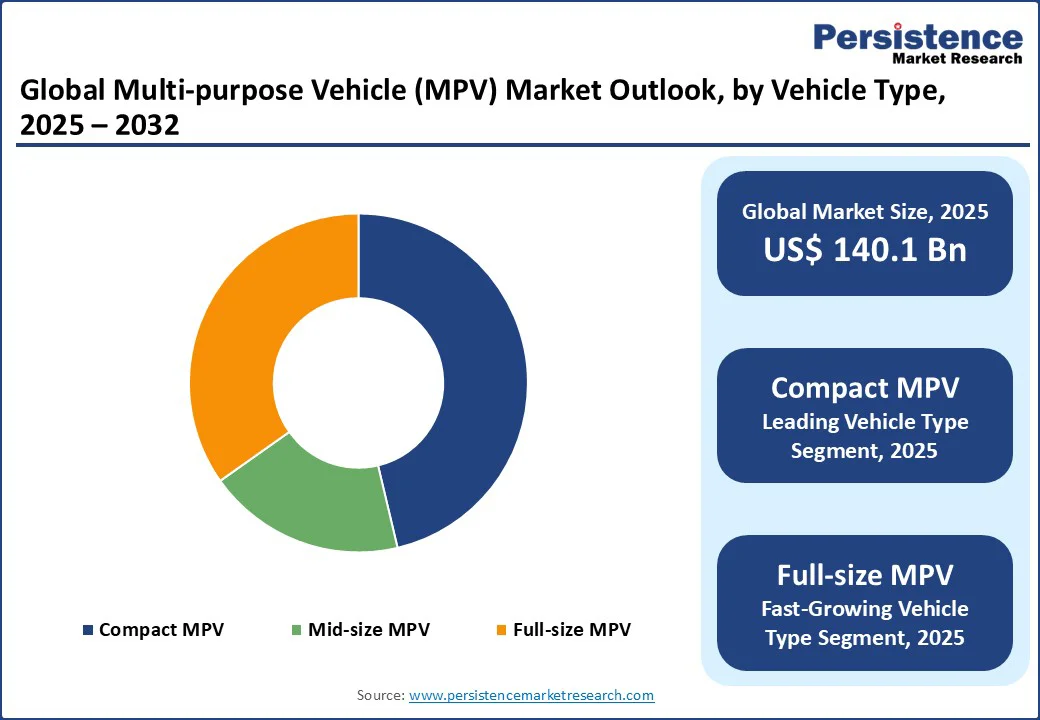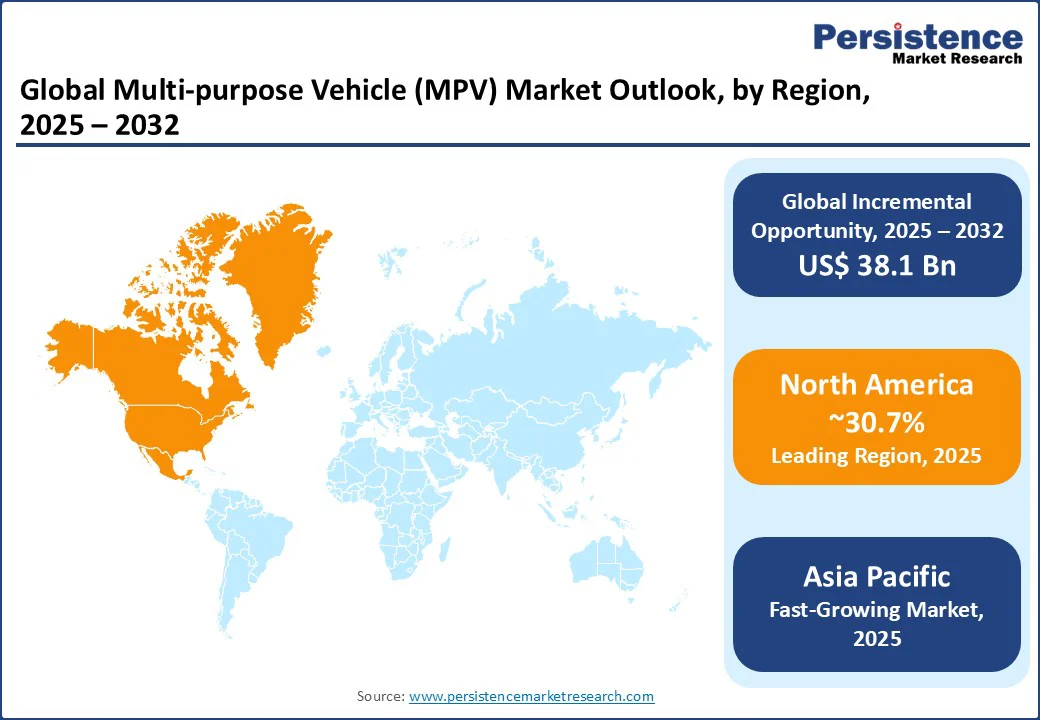ID: PMRREP35601| 187 Pages | 10 Sep 2025 | Format: PDF, Excel, PPT* | Automotive & Transportation

The multi-purpose vehicle (MPV) market size is likely to be valued at US$ 140.1 Bn in 2025 and is estimated to reach US$ 178.2 Bn in 2032, growing at a CAGR of 3.5% during the forecast period 2025 - 2032.
Key Industry Highlights

| Global Market Attribute | Key Insights |
|---|---|
| Multi-purpose Vehicle (MPV) Market Size (2025E) | US$ 140.1 Bn |
| Market Value Forecast (2032F) | US$ 178.2 Bn |
| Projected Growth (CAGR 2025 to 2032) | 3.5% |
| Historical Market Growth (CAGR 2019 to 2024) | 2.8% |
The multi-purpose vehicle (MPV) market growth is being fueled by evolving family travel requirements and increasing adoption of electrified powertrains. Businesses are meeting this demand by developing versatile and multi-functional models that cater to both personal and commercial applications.
Key strategies include diversification of product portfolios with hybrid and fully electric variants, modular interior designs, and technology integration for improved passenger experience.
MPVs are seeing high demand globally due to their ability to accommodate large families and support carpooling. The COVID-19 pandemic boosted the trend of shared commuting and multi-generational travel. It made vehicles with three-row seating, configurable interiors, and ample cargo space highly attractive.
Models such as Toyota Sienna and Honda Odyssey have capitalized on this demand by delivering flexible seating arrangements. These include second-row seats and fold-flat third rows, thereby enabling families to easily adapt the interior for passengers or luggage.
Carpooling initiatives in Europe and North America are also contributing to rising MPV sales. With surging awareness of reducing traffic congestion and carbon emissions, schools, ride-sharing services, and corporate fleets are opting for MPVs.
Demand is further spurred by lifestyle shifts toward recreational travel and long-distance trips. Large MPVs provide not only space but comfort, entertainment systems, and premium amenities. These make them appealing for weekend getaways, school runs, and group travel.
The adoption of MPVs is being hampered to a certain extent by their inherent limitations in off-road capability and lower ground clearance. These make them less versatile in regions with rough terrain or poor road infrastructure.
Most MPVs are designed primarily for urban and highway driving, focusing on passenger comfort and cargo flexibility rather than rugged performance. This limitation discourages buyers in markets such as India, where uneven roads and frequent potholes require vehicles that can handle challenging conditions.
The lower ground clearance also impacts the vehicle’s ability to navigate snow or flood-prone areas. This is expected to be a concern in certain countries across Europe and North America during winter or monsoon seasons. Consumers often prefer high-riding SUVs in such scenarios, even if MPVs deliver superior interior space and comfort. In addition, limited off-road capability affects the perception of MPVs as multipurpose vehicles.
The adoption of ‘skateboard’ EV platforms in electric MPVs is creating new avenues by fundamentally reimagining interior space and vehicle functionality. With the battery pack housed beneath the floor, the traditional intrusion of engine components and transmission tunnels is eliminated.
This allows manufacturers to design flat, unobstructed cabin floors. It also enables highly flexible seating arrangements such as sliding, foldable, or even removable seats, which can transform a single vehicle from a family transporter to a cargo hauler or a leisure vehicle in minutes.
The platform further allows designers to broaden cabin width and optimize passenger comfort without increasing the vehicle footprint. It makes MPVs ideal for urban environments where parking space is limited.
Also, the skateboard platform facilitates integration of new technologies, including sliding infotainment screens, underfloor storage compartments, and improved climate control systems, without compromising passenger space. It also supports electrification of large MPVs, enabling long range and better weight distribution.
By vehicle type, the market is trifurcated into compact MPV, mid-size MPV, and full-size MPV. Out of these, compact MPVs are predicted to account for nearly 46.3% of share in 2025 owing to their ability to provide the practicality of a traditional MPV while maintaining the maneuverability and efficiency of a small vehicle.
Urbanization and increasing traffic congestion have raised demand for vehicles that provide ample passenger and cargo space without being cumbersome. Models such as Toyota Sienta and Honda Freed demonstrate this appeal, blending flexible seating arrangements with compact dimensions suitable for city driving.
Full-size MPVs are gaining popularity worldwide backed by their unmatched versatility and spaciousness, which cater to large families, corporate transport, and premium travel experiences. These models deliver three-row seating with generous legroom, novel comfort features, and high payload capacity.
These features make them suitable for both passenger and cargo transport. Modern full-size MPVs are often equipped with cutting-edge infotainment systems, premium audio, panoramic sunroofs, and high-end safety features, thereby pushing demand.
Based on propulsion, the market is bifurcated into Internal Combustion Engine (ICE) and electric. Among these, electric is speculated to hold a share of around 63.2% in 2025 due to a combination of environmental concerns, regulatory pressure, and technological developments that improve practicality and performance.
Governments across Europe, North America, and Asia Pacific are implementing strict emission standards and providing incentives for EV adoption. This has propelled the shift from internal combustion engines to electric powertrains.
ICE MPVs are gaining traction owing to their affordability, widespread infrastructure, and reliability. It is evident in regions where EV adoption is still nascent. In India, ICE-powered MPVs continue to dominate as consumers prioritize fuel accessibility, ease of maintenance, and lower upfront costs over the higher investment required for electric models.
Another factor contributing to ICE’s sustained appeal is its proven performance for long-distance travel and heavy-duty usage. Full-size ICE MPVs provide superior engine power and towing capabilities, making them suitable for large families, corporate transport, and fleet operations.

In 2025, North America is estimated to hold approximately 30.7% of share due to the availability of traditional minivans and the gradual introduction of electric as well as hybrid models. While the MPV category remains overshadowed by the dominance of SUVs, there is a noticeable shift toward fuel-efficient and versatile vehicles that cater to the requirements of modern families. Traditional models, including the Toyota Sienna and Honda Odyssey, continue to hold key market share.
These vehicles are often appreciated for their spacious interiors and family-friendly features. However, the segment is witnessing a transformation with the introduction of electrified options. The Chrysler Voyager, for instance, is poised to return to the market in late 2025 after a hiatus, providing a more affordable entry point into the MPV category. It comes with features such as a 10-inch Uconnect touchscreen, Stow 'n Go seating, and adaptive cruise control, making it an attractive option for budget-conscious consumers.
In Asia Pacific, the market is experiencing a key transformation because of the ongoing shift toward electrification, increased competition, and evolving consumer preferences. China continues to lead the market not only in terms of production but also in the adoption of electric MPVs. The BYD Denza D9, launched in early 2025, exemplifies this trend. This luxury electric MPV is available in multiple configurations, including front-wheel and all-wheel drive, and delivers a range of up to 520 km.
The vehicle has been introduced across several countries in Southeast Asia, including Indonesia, Malaysia, Singapore, and Thailand. This indicates BYD's strategic push into the regional MPV segment. In India, the market is witnessing the entry of new electric models. Kia launched the Carens Clavis EV in July 2025. It aims to tap into the surging demand for EVs. This move caters to the government’s push toward electric mobility and reflects a broad trend of electrification in the MPV segment.
In Europe, the market is being propelled by the increasing adoption of EVs and the entry of new players. The Volkswagen ID. Buzz has emerged as a leader in the electric MPV category, with more than 17,000 units sold in the first half of 2025. It is followed by the Opel Combo-e Life and Toyota Proace Electric. These models are gaining popularity due to their spacious interiors and zero-emission credentials, catering to Europe's push toward sustainable mobility.
China-based automakers are making their way toward Europe’s market. BYD has launched its premium sub-brand Denza in Europe, debuting with the Z9 GT and the D9 MPV. Both feature novel technologies such as BYD’s e³ Platform and luxurious interiors. Similarly, XPeng's X9 electric minivan, which combines the agility of an SUV with the practicality of an MPV, has been introduced in Europe. Traditional domestic players are also broadening their electric MPV lines.

The multi-purpose vehicle (MPV) market is marked by the presence of various traditional automakers, emerging EV manufacturers, and shifting consumer preferences. Established players such as Toyota, Kia, and Honda continue to dominate with models such as the Toyota Sienna, Kia Carnival, and Honda Odyssey leading in sales.
These vehicles are favored for their spacious interiors, family-friendly features, and, in some cases, hybrid powertrains that appeal to environmentally conscious consumers. However, the market is witnessing disruption from new entrants, especially in the electric MPV segment. China-based players are making substantial inroads with novel products.
The multi-purpose vehicle (MPV) market is projected to reach US$ 140.1 Bn in 2025.
Rising demand for family-friendly vehicles and surging shared mobility initiatives are the key market drivers.
The multi-purpose vehicle (MPV) market is poised to witness a CAGR of 3.5% from 2025 to 2032.
Key market opportunities include development of compact MPVs for urban areas and integration of skateboard EV platforms.
Toyota Motor Corporation, Honda Motor Co., Ltd., and Kia Corporation are a few key market players.
| Report Attribute | Details |
|---|---|
| Historical Data/Actuals | 2019 - 2024 |
| Forecast Period | 2025 - 2032 |
| Market Analysis | Value: US$ Bn/Mn, Volume: As Applicable |
| Geographical Coverage |
|
| Segmental Coverage |
|
| Competitive Analysis |
|
| Report Highlights |
|
| Customization and Pricing | Available upon request |
By Vehicle Type
By Application
By Propulsion
By Region
Delivery Timelines
For more information on this report and its delivery timelines please get in touch with our sales team.
About Author